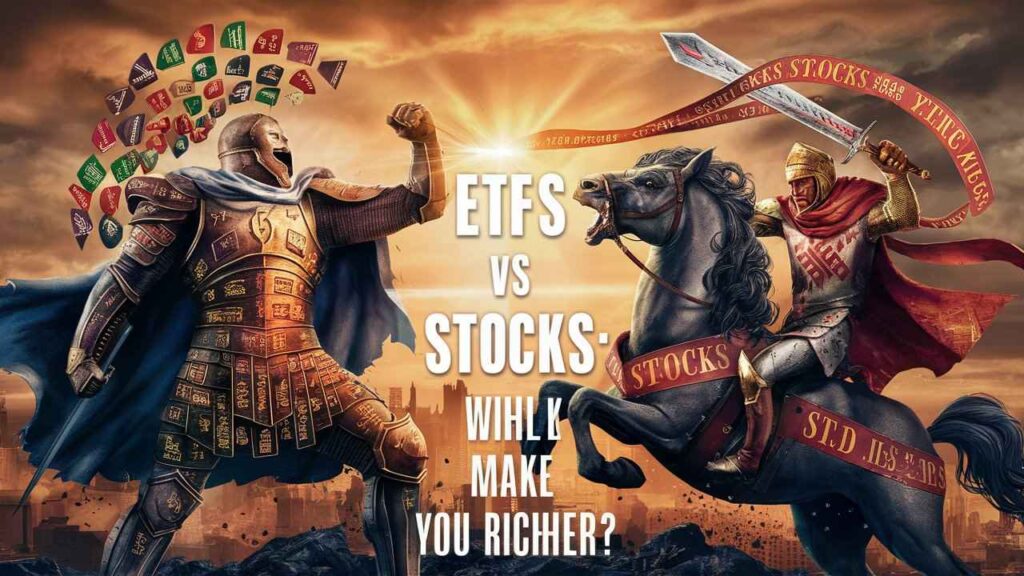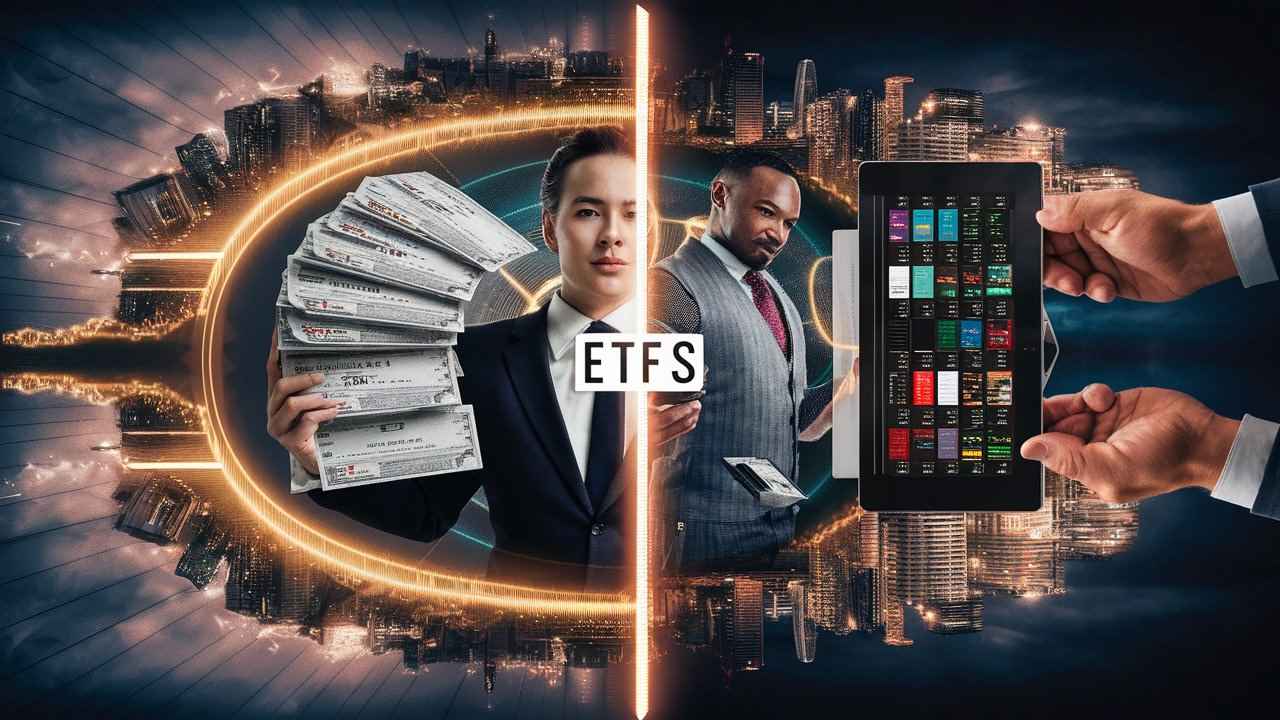The Investment Showdown: ETFs vs Stocks
Welcome to the grand arena of finance, where two titans clash: ETFs vs Stocks. On one side, we have the dashing and versatile Exchange-Traded Funds (ETFs), often seen as the Swiss Army knives of investing. On the other, the traditional stocks stand proudly, representing the very essence of wealth-building. Each option offers its own set of perks, challenges, and perhaps a sprinkle of drama. But fear not! By the end of this article, you’ll be equipped with the knowledge to choose your champion.

Why This Debate Matters for Your Wallet
Why should you care about this financial face-off? Because the right choice could be the difference between an overflowing bank account and a sad, empty wallet. Your investment strategy is like your personal style: it should reflect who you are and what you aspire to achieve. So, let’s dive into this battle, arming you with insights to make a well-informed decision!
Understanding the Basics
What Are Stocks? The Building Blocks of Wealth
Stocks, my friend, are akin to owning a piece of a company’s pie. When you purchase a stock, you’re not just throwing your money into the abyss; you’re buying a share in the company’s future, hoping it flourishes. With stocks, the potential for high returns is dazzling, but beware💰the path can be bumpy. Prices fluctuate like a roller coaster, and unless you’re holding a golden ticket (also known as insider knowledge), you’ll need some luck along with your research.
What Are ETFs? The Investment Swiss Army Knife
Imagine if stocks threw a party and invited various asset classes. That’s essentially what ETFs do. An ETF is a collection of stocks, bonds, or other securities packaged into a single share. They offer diversification without requiring you to become a financial wizard. Want a slice of tech, a sprinkle of healthcare, and a dash of energy? An ETF can serve it all up on one plate. It’s the ideal solution for those who want exposure to multiple sectors without the hassle of managing a cornucopia of individual stocks.💰

The Great Debate: ETFs vs Stocks
Defining Features: What Sets Them Apart?
At first glance, ETFs vs Stocks may seem like apples and oranges, but they share some fundamental similarities while boasting unique features. Stocks provide ownership and the potential for dividends, while ETFs offer diversification and liquidity. Stocks can be more volatile and require more hands-on management, whereas ETFs provide a more passive approach. It’s like comparing a thrilling adventure ride to a scenic train journey💰both are fun, but the experience varies significantly.
Risk Factor Showdown: Which One is Safer?
When it comes to risk, stocks can feel like walking a tightrope over a pool of piranhas💰exhilarating but terrifying. An individual stock can skyrocket or nosedive based on company performance or market conditions. ETFs, with their diversification, can cushion the blow of a poorly performing asset. However, they aren’t immune to market downturns, especially in a bear market. In the end, risk tolerance is your personal compass, guiding you through the uncertain waters of investment.

Performance Over Time
Historical Returns: Who Takes the Crown?
Let’s talk numbers💰because what’s a financial debate without some cold, hard statistics? Historically, stocks have produced higher average returns than ETFs. Yet, ETFs have gained traction as more investors appreciate the benefits of diversification. This isn’t a clear-cut battle; the winner depends on market conditions and the types of stocks or ETFs you choose.
Volatility and Stability: The Rollercoaster Ride
Investing can be like riding a rollercoaster. Stocks, especially tech or biotech, are known for their dizzying highs and gut-wrenching lows. ETFs, on the other hand, tend to smooth out that ride, providing a more stable experience. So, do you crave adrenaline or a leisurely stroll? Your preference here can guide your investment strategy.💰

Cost Comparison
Fees and Expenses: The Hidden Costs of Investing
Ah, the sneaky fees! When investing, it’s essential to keep an eye on the costs. Stocks typically incur commissions, while ETFs may have management fees, albeit lower than mutual funds. But don’t be fooled💰those little fees can add up over time and chip away at your profits. Always read the fine print and calculate the total cost of ownership!
Commissions and Taxes: What’s the Bottom Line?
When comparing ETFs vs Stocks, taxes come into play like an unexpected guest at a party. Stocks might trigger capital gains taxes when sold for a profit, while ETFs usually allow you to defer taxes until you sell. This little tax dance can significantly impact your overall returns. Understanding the tax implications of your investments can save you a boatload of cash in the long run.💰

Liquidity and Accessibility
How Easy is It to Buy and Sell?
Want to sell your stocks or ETFs faster than a cheetah on caffeine? Both are traded on major exchanges, so you can buy and sell them easily during market hours. However, certain ETFs might have lower trading volumes, which could affect liquidity. Always check the trading volume before diving in.
Market Hours vs. After-Hours: When Can You Trade?
The stock market operates like a night owl💰its hours are set and specific. While you can trade stocks during regular market hours, ETFs also offer after-hours trading, giving you more flexibility. Just remember, trading after hours can come with its own set of risks, including lower liquidity and increased volatility.

Diversity and Flexibility
Diversification: The Power of Spreading Your Bets
Ever heard the saying, “Don’t put all your eggs in one basket”? That’s the essence of diversification! Stocks can offer robust returns but come with higher risks. ETFs allow you to spread your investment across various assets, reducing your overall risk exposure. This diversification can make your portfolio resilient, helping you weather market storms more effectively.💰
The Variety of ETFs: More Than Just Stocks
ETFs aren’t just a one-trick pony; they come in various flavors. Want to invest in international markets? There’s an ETF for that! Prefer to focus on specific sectors like green energy or technology? You guessed it💰there’s an ETF for those too. This versatility makes ETFs a fantastic option for those looking to tailor their investments to fit their unique interests.
Tax Implications
Capital Gains: Who Gets Taxed More?
Taxation💰everyone’s favorite topic! When you sell a stock at a profit, you might owe capital gains taxes. ETFs are generally more tax-efficient due to their structure, allowing investors to defer capital gains until they sell the ETF. This tax advantage can add up over time, boosting your returns and keeping Uncle Sam at bay for a while longer.
Tax Efficiency: Which Option Leaves You with More?
When considering ETFs vs Stocks, tax efficiency plays a significant role. Generally, ETFs are more tax-efficient due to their “in-kind” creation and redemption process. This process helps minimize taxable events, leading to a happier, more prosperous investment experience. Knowing how your investments will be taxed is crucial to maximizing your hard-earned dollars.
Strategies for Success
When to Choose Stocks: The Art of Picking Winners
If you fancy yourself a stock-picking prodigy, going for individual stocks could be your ticket to glory. This strategy works well for those willing to do the homework and research underlying companies. If you’re ready to roll up your sleeves and dive into earnings reports, market trends, and company performance, you could reap impressive rewards. Just remember: with great power comes great responsibility!💰
When to Opt for ETFs: The Power of Passive Investing
Prefer to sit back, relax, and let someone else do the heavy lifting? ETFs might be your best bet. They allow you to take a hands-off approach while still reaping the benefits of the market. By investing in a diversified basket of securities, you can enjoy the rewards of growth without the pressure of stock-picking.
The Emotional Factor
Psychology of Investing: How Each Option Affects You
Investing is not just about numbers; it’s about emotions too. Stocks can trigger excitement and anxiety, often leading to impulsive decisions. ETFs, being more stable, may help mitigate those emotional rollercoasters, allowing you to maintain a cooler head. Understanding your emotional responses to investing can significantly influence your strategy and outcomes.💰
Fear and Greed: Navigating Your Investment Journey
Fear and greed are two of the most powerful emotions in investing. The fear of missing out (FOMO) can push you toward risky investments, while the greed for higher returns might lead to poor decision-making. Being aware of these emotions can help you navigate the complexities of ETFs vs Stocks and craft a strategy that aligns with your financial goals.
Common Misconceptions
Debunking Myths: ETFs vs Stocks
There are plenty of misconceptions swirling around like confetti at a parade. Some think ETFs are only for passive investors, while others believe stocks are only for those who want high-risk, high-reward opportunities. The truth? Both can fit various investment styles. Debunking these myths can empower you to choose the right path for your financial journey.💰
What Your Financial Advisor Might Not Tell You
Your financial advisor may not always share the full picture. Sometimes, they might favor products that earn them higher commissions. It’s essential to question and research your options independently. The more informed you are, the better equipped you’ll be to navigate the complex landscape of investing.
Real-Life Examples
Success Stories: Investors Who Struck Gold
Success in investing often comes down to timing, knowledge, and a little luck. Many investors have made their fortunes through well-timed stock purchases or by hopping on the ETF train early. Look at individuals like Warren Buffett, who has built an empire through careful stock
selection. However, others have benefited from the diversified safety nets that ETFs provide. Learning from these success stories can offer valuable insights into your investment strategy.
Cautionary Tales: Learning from Investment Fails
Not every investment story has a happy ending. There are cautionary tales aplenty💰investors who put all their eggs in one basket only to watch it crash and burn. These missteps highlight the importance of diversification, research, and the wisdom of balancing your portfolio. By learning from others’ mistakes, you can make more informed choices and avoid repeating history.
Making the Right Choice for You
Assessing Your Financial Goals: What Do You Want?
Before diving into ETFs vs Stocks, take a moment to reflect on your financial goals. Are you looking for long-term growth, short-term gains, or a mix of both? Identifying your objectives will help you determine which investment vehicle suits you best. Clarity is key💰when you know what you want, it becomes easier to devise a strategy.
Risk Tolerance: Finding Your Comfort Zone
Everyone has a different appetite for risk. Assessing your risk tolerance is vital in determining whether stocks or ETFs are more suitable for you. Do you thrive on the excitement of high-risk, high-reward investments? Or do you prefer the safety net that ETFs provide? Knowing your limits will guide your investment decisions and help you stay on track.
Combining Forces: Can You Have Both?
The Hybrid Approach: Balancing ETFs and Stocks
Why choose one when you can have both? A hybrid approach allows you to enjoy the benefits of each investment type. By blending individual stocks with diversified ETFs, you can create a well-rounded portfolio that balances risk and reward. This strategy can keep your investment journey exciting while still providing a safety net.💰
Portfolio Construction: The Best of Both Worlds
Building a portfolio is like crafting a masterpiece. By strategically combining ETFs vs Stocks, you can create a beautiful and robust investment canvas. The right mix will depend on your goals, risk tolerance, and market conditions. With careful planning, your portfolio can weather the storms of the financial world while steadily moving toward your financial dreams.
Frequently Asked Questions
Can You Lose Money with ETFs?
Yes, you can! While ETFs offer diversification and generally reduce risk, they’re not immune to market downturns. If the market declines, your ETF value may drop along with it. It’s essential to understand that all investments carry inherent risks.
How Much Money Do You Need to Start Investing?
The great news is that you don’t need a fortune to begin your investing journey. Many brokers allow you to start with as little as $100. However, to build a well-diversified portfolio, having a few thousand dollars is ideal. Start small and grow your investments over time!💰
What’s the Best Strategy for Beginners?
For beginners, a balanced approach involving low-cost ETFs can be a fantastic starting point. This strategy allows for diversification and minimizes the stress of picking individual stocks. Over time, as you gain confidence and knowledge, you can gradually introduce stocks into your portfolio.
Conclusion
ETFs vs Stocks: The Final Verdict
So, who wins the battle of ETFs vs Stocks? The answer is: it depends! Each investment vehicle has its merits and drawbacks. Your ultimate choice hinges on your financial goals, risk tolerance, and personal preferences.💰
Your Next Steps: Crafting an Investment Plan That Works
Now that you’re armed with knowledge, it’s time to take action. Craft an investment plan that aligns with your goals, balances risk, and incorporates both ETFs and stocks as needed. Don’t forget to revisit and revise your strategy as you grow and evolve in your investing journey.
Wealth-Building Wisdom: Making Informed Decisions
In the end, the key to wealth building lies in making informed, thoughtful decisions. Whether you choose ETFs, stocks, or a mix of both, approach your investments with curiosity, research, and patience. Happy investing!
People Also Ask
Are ETFs better than stocks?
Whether ETFs are better than stocks depends on your investment strategy and goals. ETFs offer diversification, making them less risky than individual stocks. However, if you’re a skilled stock picker, you might achieve higher returns with individual stocks.
Why is ETF not a good investment?
ETFs might not be ideal for everyone. They can incur management fees, and some have lower trading volumes, leading to potential liquidity issues. Additionally, investors might miss out on higher returns from individual stocks in a booming market.
What is the best ETF to invest $1000 in?
The best ETF for investing $1000 depends on your risk tolerance and investment goals. Popular options include the SPDR S&P 500 ETF (SPY) for broad market exposure or Vanguard Total Stock Market ETF (VTI) for comprehensive U.S. market coverage.
Are ETFs good for beginners?
Yes, ETFs are excellent for beginners. They offer diversification, lower costs, and ease of trading. New investors can gain exposure to various sectors without needing to pick individual stocks, making them a more manageable option.
What is the top 3 ETF?
Some of the top ETFs include:
- SPDR S&P 500 ETF (SPY): Tracks the S&P 500 index, providing exposure to large-cap U.S. companies.
- Invesco QQQ Trust (QQQ): Focuses on the tech-heavy Nasdaq-100 index.
- Vanguard Total Stock Market ETF (VTI): Offers exposure to the entire U.S. stock market.
Is ETF halal?
Many ETFs can be considered halal if they comply with Islamic law. It’s essential to look for ETFs that avoid companies involved in alcohol, gambling, and other non-compliant sectors. Always verify with a financial advisor or halal certification service.
Do ETFs pay dividends?
Yes, many ETFs pay dividends. These dividends come from the underlying stocks held within the ETF. Some ETFs even focus specifically on dividend-paying stocks, providing investors with regular income.
Which ETF gives the highest return?
The ETF with the highest return can vary over time and depends on market conditions. Historically, sector-specific ETFs, like those focused on technology or biotechnology, have produced high returns. Always research current performance and market trends.
Can ETFs go to zero?
Yes, ETFs can go to zero, but it’s rare. This usually occurs if the underlying assets within the ETF lose all their value, which can happen during extreme market downturns. However, diversified ETFs are designed to mitigate this risk.
Can I withdraw ETFs anytime?
You can sell your ETFs anytime during market hours, just like stocks. However, the actual withdrawal of funds may take a couple of days to process, depending on your brokerage’s policies.
What is the safest ETF?
The safest ETFs typically invest in bonds or blue-chip stocks. For example, the iShares U.S. Treasury Bond ETF (GOVT) is considered safe due to its investment in U.S. government securities. Always evaluate your risk tolerance before investing.
Is ETF high risk?
ETFs can vary in risk depending on their holdings. Broad market ETFs are generally less risky than sector-specific or leveraged ETFs. It’s essential to understand the underlying assets before investing.
Can ETFs lose money?
Yes, ETFs can lose money, especially during market downturns. While diversification helps mitigate risk, the value of an ETF can decline based on the performance of its underlying assets.
Should I buy ETFs every month?
Investing in ETFs monthly can be a sound strategy, especially for beginners. This approach, known as dollar-cost averaging, allows you to invest consistently and reduce the impact of market volatility over time.
Is 10 ETFs too much?
Owning 10 ETFs might be excessive if it leads to over-diversification. While diversification is essential, it’s crucial to ensure your portfolio remains manageable. Focus on quality rather than quantity to maintain a balanced investment strategy.
What is the strongest ETF?
The strongest ETF can vary based on market conditions and performance metrics. ETFs like the Invesco QQQ Trust (QQQ), known for its robust performance in tech, often rank highly. Research and track current trends to identify strong performers.
How to invest $5000 dollars for quick return?
Investing $5000 for quick returns involves higher risk. Consider looking into growth ETFs or sector-specific ETFs that are expected to perform well in the short term. However, always be cautious of the risks associated with seeking quick returns.
How long do you hold ETFs?
The holding period for ETFs depends on your investment strategy. Many investors hold ETFs for the long term to benefit from compounding returns, while others may trade them more frequently based on market conditions. Define your strategy before investing.
Which ETF has the best 10-year return?
The ETF with the best 10-year return can change over time. Historically, technology-focused ETFs, like the Invesco QQQ Trust (QQQ), have shown impressive long-term performance. Always check the latest data to make informed decisions.









